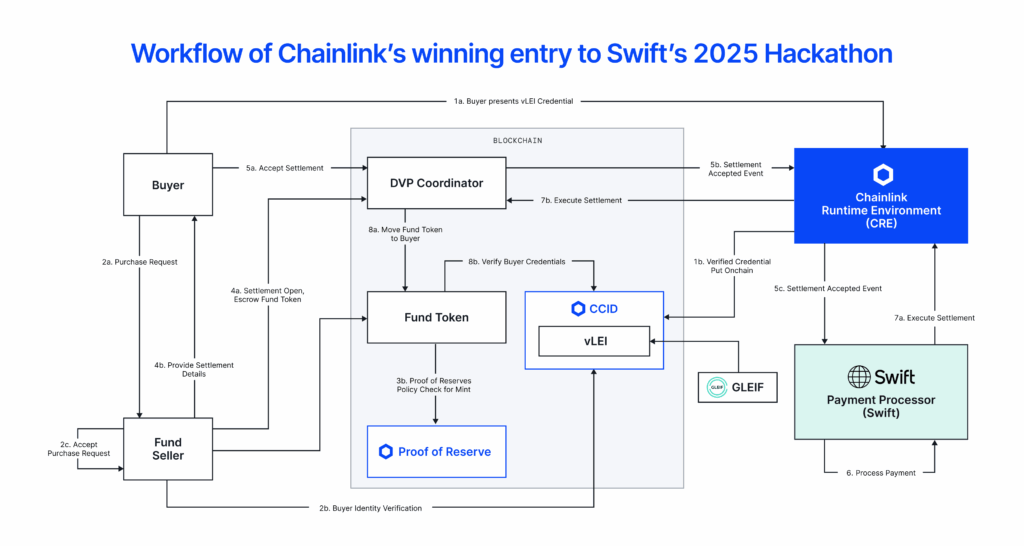Chainlink Selected as Winner of the Swift Hackathon 2025 Business Challenge
We’re excited to announce that Chainlink has been selected as the winner of the Swift Hackathon 2025 Business Challenge. Chainlink’s winning solution unlocks fast, compliance-focused, and privacy-preserving digital asset settlement across borders and blockchains.
A record-breaking 104 entrants made this Hackathon Swift’s largest yet, with premier financial institutions like Credit Agricole CIB, Deutsche Bank, and Standard Chartered among the finalists.
Chainlink’s winning solution unlocks fast, compliance-focused, and privacy-preserving digital asset settlement across borders and blockchains. We successfully demonstrated how Chainlink’s Automated Compliance Engine (ACE) and the Chainlink Runtime Environment (CRE), in conjunction with GLEIF’s vLEI and Swift messages, unlock a new cross-chain, cross-border model for the trading and settlement of regulated digital assets.
The same winning approach can be extended to power regulatory-compliant stablecoins, tokenized deposits, central bank digital currencies (CBDCs), digital securities, and other tokenized financial instruments.
In this blog, we summarize the Swift Hackathon 2025 Business Challenge, Chainlink’s winning solution, and how it transforms global finance.
Swift Hackathon 2025 Business Challenge: Unlocking Speed, Cost, and Transparency In Digital Payments
“In today’s digital asset ecosystem, fragmentation and a lack of interoperability between networks is a major concern – especially for firms adopting new forms of money. There’s also a clear need to connect these emerging networks with established systems.” — Hackathon 2025
Financial institutions across the globe are integrating digital assets into their business to improve cross-border flows by reducing costs, enhancing speed, and improving transparency. However, divergent market practices, complex regulatory requirements, and a lack of interoperability between siloed blockchain networks and traditional systems are preventing institutions from realizing the transformative benefits of blockchain technology.
To unlock blockchain’s potential, Swift’s 2025 Hackathon challenged institutions to make digital money more practical for global payments by building end-to-end transaction flows that:
- Enable interoperability by connecting blockchain-native identifiers (e.g., wallets, transaction hashes, token IDs) with traditional financial identifiers (e.g., BICs, LEIs/vLEIs, IBANs).
- Establish data integrity through mechanisms like proof of reserves that provide verifiable assurance across networks and currencies.
- Support regulatory compliance by integrating tools, such as GLEIF’s Legal Entity Identifiers (LEIs) and verifiable LEIs (vLEIs), helping ensure that cross-border flows meet global financial reporting requirements.
Chainlink’s Winning Solution: Compliance-Focused Digital Asset Settlement Leveraging GLEIF’s vLEI-Based Identity and Onchain Policy Enforcement
In the Swift Hackathon 2025 Business Challenge, we successfully demonstrated how Chainlink’s Automated Compliance Engine (ACE), in conjunction with GLEIF’s vLEI, provides a regulatory control framework for the trading and settlement of digital assets, such as tokenized funds. We demonstrated policies of different types defined by relevant parties, such as issuers and regulators, that are automatically enforced in the context of delivering digital asset tokens in exchange for payment made over Swift.
Specifically, the solution demonstrates:
- Interoperability with offchain systems by connecting public blockchain platforms, GLEIF’s vLEI identity registry, and Swift payment rails using Cross-Chain Identity (CCID) and the Chainlink Runtime Environment (CRE). This facilitated the mapping of wallet addresses and token flows to specific LEIs, unlocking seamless cross-network settlement using trusted standards.
- Data privacy and integrity by ensuring that onchain verifiable credentials were created and utilized in transactional flows without revealing any personal information of the parties involved. All identity verifications (e.g., KYC/AML, accreditation) are turned into verifiable credentials that are privately issued and publicly referenced via CCID to ensure privacy-by-design. Furthermore, we utilized Chainlink Proof of Reserve to ensure that asset-backed tokens are minted only when reserves are confirmed by trusted custodians, preventing over-issuance and ensuring real-time integrity of tokenized assets. By associating the custodians and issuers with verifiable Legal Entity Identifiers (vLEIs), their identity and authority were cryptographically proven onchain, adding a layer of organizational trust, auditability, and regulatory-grade assurance to the entire asset lifecycle.
- Regulatory compliance was achieved by implementing atomic onchain policies that define and enforce transactional constraints. Chainlink’s Policy Manager enabled programmable enforcement of compliance logic, such as jurisdictional restrictions, sanctions screening, and subscription limits, directly within smart contracts. These rules reference verified vLEIs and KYC attributes stored within CCIDs, ensuring every transaction satisfies cross-border regulatory requirements without exposing personal data or relying on third parties.

While Chainlink’s winning solution focused on the specific use case of tokenized fund Delivery vs. Payment (DvP), the underlying architecture and identity framework can be replicated to power compliance-focused stablecoins, tokenized deposits, central bank digital currencies (CBDCs), digital securities, and other tokenized financial instruments.
7+ Years of Award-Winning Innovation
In 2016, the team that would later found Chainlink Labs won Swift’s Industry Challenge. As the winner, Chainlink Co-Founder Sergey Nazarov showcased blockchain and oracle technologies to the Swift community at their premier financial services event, Sibos.
Chainlink has since collaborated with Swift and others on several groundbreaking solutions, including connecting existing Swift standards to blockchains, demonstrating a secure and scalable way to transfer tokenized assets, successfully bridging tokenized assets with existing payment systems, and transforming asset servicing with AI, oracles, and blockchains.
As Chainlink’s ongoing work with Swift demonstrates, now reinforced by winning the Business Challenge award at Swift’s 2025 Hackathon, oracle infrastructure is enabling the convergence of the blockchain ecosystem with traditional finance and paving the way for more accessible, transparent, and reliable global markets.